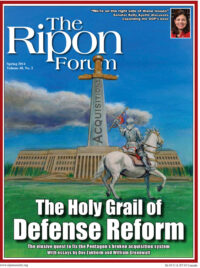Congress, the President, and the role of nuclear weapons in an increasingly unstable world
 Presidential calls for a world without nuclear weapons are nothing new. After all, these terrible products of human ingenuity can cause a lot of damage and suffering. So what is different about President Barack Obama’s call for a world without nuclear weapons this time around?
Presidential calls for a world without nuclear weapons are nothing new. After all, these terrible products of human ingenuity can cause a lot of damage and suffering. So what is different about President Barack Obama’s call for a world without nuclear weapons this time around?
As a sign of its commitment to nuclear weapons reductions, the Obama Administration negotiated the New Strategic Arms Reduction Treaty (New START). The failed treaty mandates that the United States bears a majority of strategic nuclear weapons reductions, while Russia is allowed to build up its arsenal. The treaty’s inadequate verification regime makes it ever more difficult to analyze the makeup and capabilities of the Russian strategic forces. This is important because since the treaty entered into force, Vladimir Putin, Russia’s President and the author of its current strategic doctrine, has announced the most extensive program of nuclear weapons modernization since the end of the Cold War.
Oblivious to the stabilizing role that U.S. nuclear weapons have had since their invention at the end of World War II, President Obama released his Nuclear Posture Review (NPR) Implementation Study last year. Driven by a desire to reduce the number of U.S. nuclear weapons and their roles in the national security strategy, the study concluded that it is safe to conduct additional reductions below the 1,550 operationally deployed strategic nuclear warheads permitted under New START.
This stunning conclusion was made possible because the Administration’s 2010 NPR maintains that “Russia and the United States are no longer adversaries, and prospects for military confrontation have declined dramatically.” Russia’s recent aggressive dismemberment of Ukraine, however, called this assumption into question. The Administration has since modified its position on reducing the number of strategic weapons below the New START levels and says that it no longer intends to make unilateral cuts. Any cuts, Secretary of Defense Chuck Hagel testified on March 6, 2014, “would have to all be, as we have done in every administration, negotiated through treaties.”
The President’s belief that other nations will follow the U.S. drive to reduce the roles and missions of nuclear weapons in their respective national security strategies is based on fantasy.
The President’s belief that other nations will follow the U.S. drive to reduce the roles and missions of nuclear weapons in their respective national security strategies is based on fantasy. Historically, new nuclear players have emerged as the U.S. has reduced its capability. South Africa gave up its nuclear weapons while the U.S. was still testing its nuclear weapons and improving its strategic and tactical nuclear weapons arsenal. China’s aggressive but opaque military buildup, nuclear and conventional, also calls for increased vigilance when it comes to maintaining flexible and resilient nuclear weapons infrastructure rather than focusing on pursuing unilateral reductions.
As it turns out, some members of Congress are not that excited about the President’s drive to U.S. nuclear zero. In House Armed Services Committee (HASC) Chairman Buck McKeon’s mark of the National Defense Authorization bill, one of the few bills that actually become law these days, members of the HASC are calling for strengthening America’s strategic posture. These calls have a renewed urgency given Russia’s aggressive invasion of Ukraine and continued violations of Moscow’s arms control obligations, including under the Intermediate-Range Nuclear Forces Treaty. The bill’s emphasis on nuclear mission is also reflected in its call for the NATO Center of Excellence on Deterrence and for refocusing military service members’ education to cover the essentials of nuclear deterrence policy and operations.
In the National Defense Authorization bill, members are calling for strengthening America’s strategic posture. These calls have a renewed urgency given Russia’s aggressive invasion of Ukraine and continued violations of Moscow’s arms control obligations.
Even more important is the HASC’s recognition that the President is not providing necessary resources to fund U.S. nuclear weapons infrastructure and sustainment plans. The U.S. is currently not really modernizing its nuclear weapons arsenal, because the President’s policy bans the development of any new nuclear weapons and precludes giving the existing ones new military missions or capabilities.
To make matters worse, the President’s supposedly enduring November 2010 commitment to U.S. nuclear deterrence is not that enduring after all. His budget requests for the National Nuclear Security Administration (NNSA) weapons activities have steadily failed to meet investments levels that the President deemed necessary to sustain reductions under New START. To that end, the HASC authorized an increase of $147.7 million in the NNSA’s weapons activities program.
The world is not getting any safer. For over 60 years, U.S. nuclear weapons deterred adversaries from conducting large-scale attacks on the U.S. and its allies. They helped to assure governments in Seoul, Tokyo so they wouldn’t develop their own nuclear capabilities. They helped to keep nuclear arsenals of NATO members smaller than would otherwise be the case.
In the fiscal year 2015 NDAA, the Committee advances prudent nuclear weapons policies to counter the President’s drive toward a world without U.S. nuclear weapons, which could have profoundly negative consequences, and is why maintaining a credible, flexible, and resilient nuclear force posture remains one of the most important tasks of U.S. decision-makers. RF
Michaela Dodge is a Policy Analyst at the Douglas and Sarah Allison Center for Foreign and National Security Policy at the Heritage Foundation.




